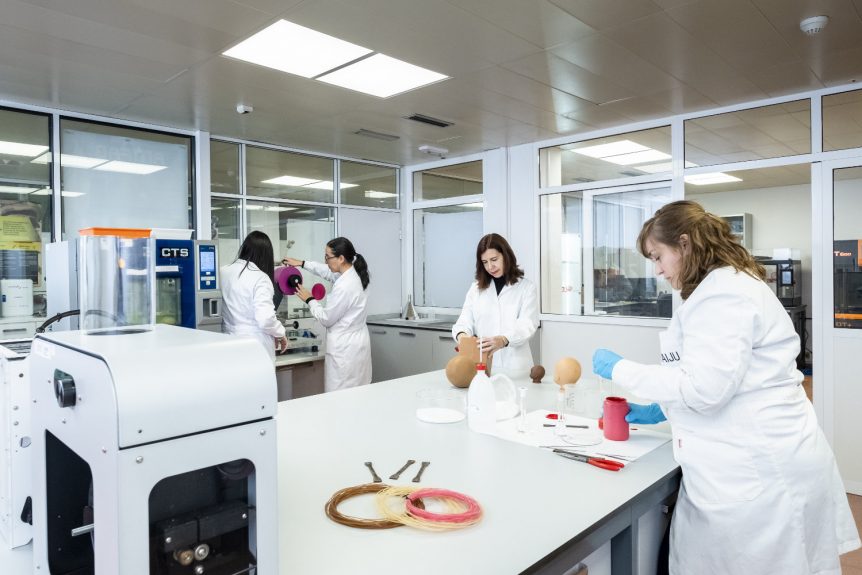Characterisation and identification of plastic materials
AIJU carries out all the necessary tests and analyses to gain in-depth knowledge of plastic materials. This allows us to provide answers and solutions to the problems that plastic processors face, and to improve their day-to-day work.
On the other hand, finished product testing ensures the quality of manufactured items. To this end, we check compliance with the regulations or legislation that apply to each article. In the absence of any such standard, we carry out tests that simulate the final behaviour of the products in order to ensure that they comply with the requirements laid down for their use with quality guarantees.

Identification and characterisation tests on plastic materials
- Characterisation of materials:
- Determination of mechanical properties.
- Tensile test.
- Compression test.
- Flexure test.
- Impact resistance:
- Izod impact resistance.
- Charpy impact resistance.
- Hardness:
- Shore hardness.
- Rockwell hardness.
- Determination of physical properties.
- Determination of relative density.
- Determination of water absorption and moisture content.
- Determination of rheological properties.
- Determination of the fluidity index.
- Viscosity index.
- Analysis of mixtures using a plastograph.
- Rheological analysis using a rotational rheometer.
- Determination of thermal properties.
- Determination of the Vicat softening temperature.
- Determination of the degradation temperature.
- Determination of oxidation induction time.
- Determination of the melting point.
- Determination of the glass transition temperature.
- Determination of flammability properties
- Glow wire test on finished products and guide.
- Glow wire flammability test on materials.
- Determination of mechanical properties.
- Identification of base material, fillers and other finished product additives by means of:
- Infrared spectrophotometer (FTIR).
- Differential scanning calorimetry (DSC).
- Thermogravimetry (TGA).
- Gas-mass chromatography (GC-MS).
- Accelerated ageing tests:
- Exposure to artificial light source with Xenon lamp.
- Ageing in an environmental chamber/stove.
- Corrosion test in a Neutral Saline Spray chamber.
- Evaluation of adhesive bonds and coatings on different substrates:
- Test of resistance of adhesives and paints to substrates.
- Measurement of coating adhesion by the cross-cut test.
- Surface treatments to improve adhesion, painting or coating:
- Surface treatment by means of low pressure plasma.
- Surface treatment by corona discharge.
- Measurement of contact angles to determine the surface energy of materials.
Performing your characterisation tests allows you to
- To know the type of base material and the fillers and/or additives that your product contains.
- Adequately control the raw material received.
- To avoid errors when choosing materials during production.
- Schedule optimal processing conditions.
- To know the most significant characteristics of the material that may restrict or extend its use.
- Facilitate component design.
- To compare your own materials with others.
- Check for contamination, decomposition or other problems.
- Verify improvements introduced in the formulations.
- Ensure the quality of the manufactured articles.
Procedure to identify and characterise plastic materials and products
We have a wide range of analytical techniques that we use to determine mechanical, thermal, physical, accelerated ageing and corrosion properties, etc. These properties are determined in both the material and the finished product.
All tests are carried out meticulously, following the guidelines of the applicable general and specific UNE/EN/ISO standards:
- Tensile test according to UNE/EN ISO 527.
- Flexure test according to UNE/EN ISO 178.
- Compression test according to UNE/EN ISO 604.
- Izod impact resistance test according to UNE/EN ISO 180.
- Charpy impact resistance test according to UNE/EN ISO 179.
- Determination of fluidity index according to UNE/EN ISO 1133.
- Density according to UNE/EN ISO 1183.
- Shore hardness according to UNE/EN ISO 868.
- Rockwell hardness according to UNE/EN ISO 2039.
- VICAT softening temperature according to UNE/EN ISO 306.
- Thermogravimetric analysis content (TGA) according to UNE/EN ISO 11358.
- Differential scanning calorimetry (DSC) according to UNE/EN ISO 11357.
- Water absorption according to UNE/EN ISO 62.
- Determination of oxidation induction time and temperature according to UNE/EN ISO 11357.
- Viscosity according to UNE/EN ISO 307.
- Glow-wire test on finished products and guide according to UNE/EN 60695 standard.
- Glow-wire flammability test on materials according to UNE/EN 60695.
- Exposure to artificial light source with Xenon lamp according to UNE/EN 4892.
We also work with ASTM and DIN standards, among others.
Our expert technical staff helps companies to select the most appropriate tests depending on the established objective.
Our lengthy experience and our laboratories are our guarantee
A specialised team, up-to-date on all standard changes, and with more than 30 years of experience. Fully equipped laboratories.
